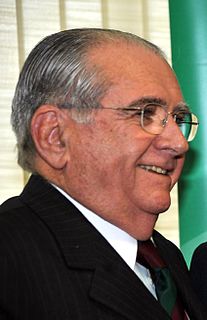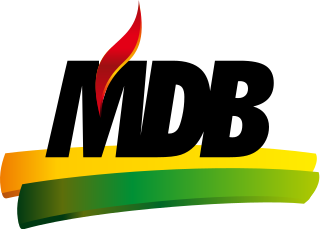
Ernesto Beckmann Geisel was a Brazilian Army officer and politician, who was President of Brazil from 1974 to 1979, during the Brazilian military government.

Tancredo de Almeida NevesSFO was a Brazilian politician, lawyer, and entrepreneur. He served as Minister of Justice and Interior Minister from 1953 to 1954, Prime Minister from 1961 to 1962, Finance Minister in 1962, and as Governor of Minas Gerais from 1983 to 1984. He was elected President of Brazil in 1985, but died before he took office.

The Brazilian military government was the authoritarian military dictatorship that ruled Brazil from April 1, 1964 to March 15, 1985. It began with the 1964 coup d'état led by the Armed Forces against the administration of President João Goulart—who, having been vice-president, had assumed the office of president upon the resignation of the democratically elected president Jânio Quadros—and ended when José Sarney took office on March 15, 1985 as President. The military revolt was fomented by Magalhães Pinto, Adhemar de Barros, and Carlos Lacerda, Governors of Minas Gerais, São Paulo, and Guanabara. The coup was also supported by the Embassy and State Department of the United States.

João Baptista de Oliveira Figueiredo was a Brazilian military leader and politician who was the 30th President of Brazil, the last of the military regime that ruled the country following the 1964 coup d'état. He was chief of the Secret Service (SNI) during the term of his predecessor, Ernesto Geisel, who appointed him to the presidency at the end of his own mandate. He took the oath of office on March 15, 1979, serving until March 15, 1985.

Aureliano Chaves was a Brazilian politician.

Diretas Já was a civil unrest movement which, in 1984, demanded direct presidential elections in Brazil.
Folha de S.Paulo, also known as Folha de São Paulo, or simply Folha, is a Brazilian daily newspaper founded in 1921 under the name Folha da Noite and published in São Paulo by the Folha da Manhã company.

The Revolution of 1930, also known as the 1930coup d'état or coup of 1930 was an armed movement in Brazil led by the states of Minas Gerais, Paraíba and Rio Grande do Sul, culminating in a coup. The revolution ousted President Washington Luís on October 24, 1930, prevented the inauguration of President-elect Júlio Prestes, and ended the Old Republic.

Presidential elections were held in Brazil on 15 January 1985, the last to be held indirectly through an electoral college, and the last to be held under the military regime. The electoral college system was put in place so that the military elite that controlled the government could secure the election of the candidate chosen by the High Command of the Armed Forces as President. However, in 1985, due to the process of negotiated transition to democracy that started in the late 1970s, the politicians in the electoral college were placed under no coercion, and were allowed to choose the president of their choice.

Fernando Haddad is a Brazilian academic and politician who served as Mayor of São Paulo from 2013 to 2017. He was the Workers' Party candidate for President of Brazil in the 2018 election, replacing former President Luiz Inácio Lula da Silva, whose candidacy was barred by the Superior Electoral Court under the Clean Slate law. Haddad faced Jair Bolsonaro in the run-off of the election, and lost the election with 44.87% of the votes against the 55.13% of Bolsonaro.

Ulysses Silveira Guimarães was a Brazilian politician and lawyer who played an important role in opposing the military dictatorship in Brazil and in the fight to restore democracy in the country. He died in a helicopter accident by the shore near Angra dos Reis, in the south of Rio de Janeiro state.

The Brazilian presidential election was held in 1974, through a electoral college system with two parties. It was the 22nd Brazilian presidential election, and the 4th from the Brazilian military government.

Indirect presidential elections were held in Brazil on 25 October 1969. The elections were the third held under the Brazilian military government, and used an electoral college system.

Indirect presidential elections were held in Brazil on 3 October 1966 through an electoral college system. It was the second election during the Brazilian military government, with Artur da Costa e Silva as the sole candidate. Costa e Silva was elected with 295 votes from the ruling National Renewal Alliance Party (ARENA).

Events in the year 1920 in Brazil.

Paulo Brossard de Souza Pinto was a Brazilian jurist and politician. Born in Bagé, Rio Grande do Sul, he graduated in Law and served several terms as a parliamentarian in his state and in the National Congress as well. He also was a member of the Supreme Federal Court and the Supreme Electoral Court of Brazil.

João Castelo Ribeiro Gonçalves was a Brazilian politician and lawyer. He served as Governor of Maranhão from March 15, 1979, to May 15, 1982.

General elections were held in Brazil on 7 October 2018 to elect the President, Vice President and the National Congress. Elections for state governors and vice governors, state legislative assemblies and the Legislative Chamber of the Federal District were held at the same time.

João Agripino da Costa Doria Júnior is a Brazilian politician, businessman and journalist who is the 37th and current Governor of São Paulo, in office since January 2019. He previously served as the 52nd Mayor of São Paulo from 1 January 2017 to his resignation on 6 April 2018. He was the first mayor in 24 years to be elected in the first round. Doria is a member of the Brazilian Social Democracy Party (PSDB), and is known for having hosted the TV show O Aprendiz, a Brazilian version of The Apprentice. Doria resigned the office of mayor in April 2018 in order to run for Governor of São Paulo.
Armando de Queiroz Monteiro Filho was a Brazilian businessman, engineer and politician. He served as the country's Minister of Agriculture from 1961 until 1962, in the cabinet of President João Goulart. He was the father of Armando Monteiro, a politician, former national Senator from Pernambuco, and former Minister of Development, Industry and Foreign Trade.





















